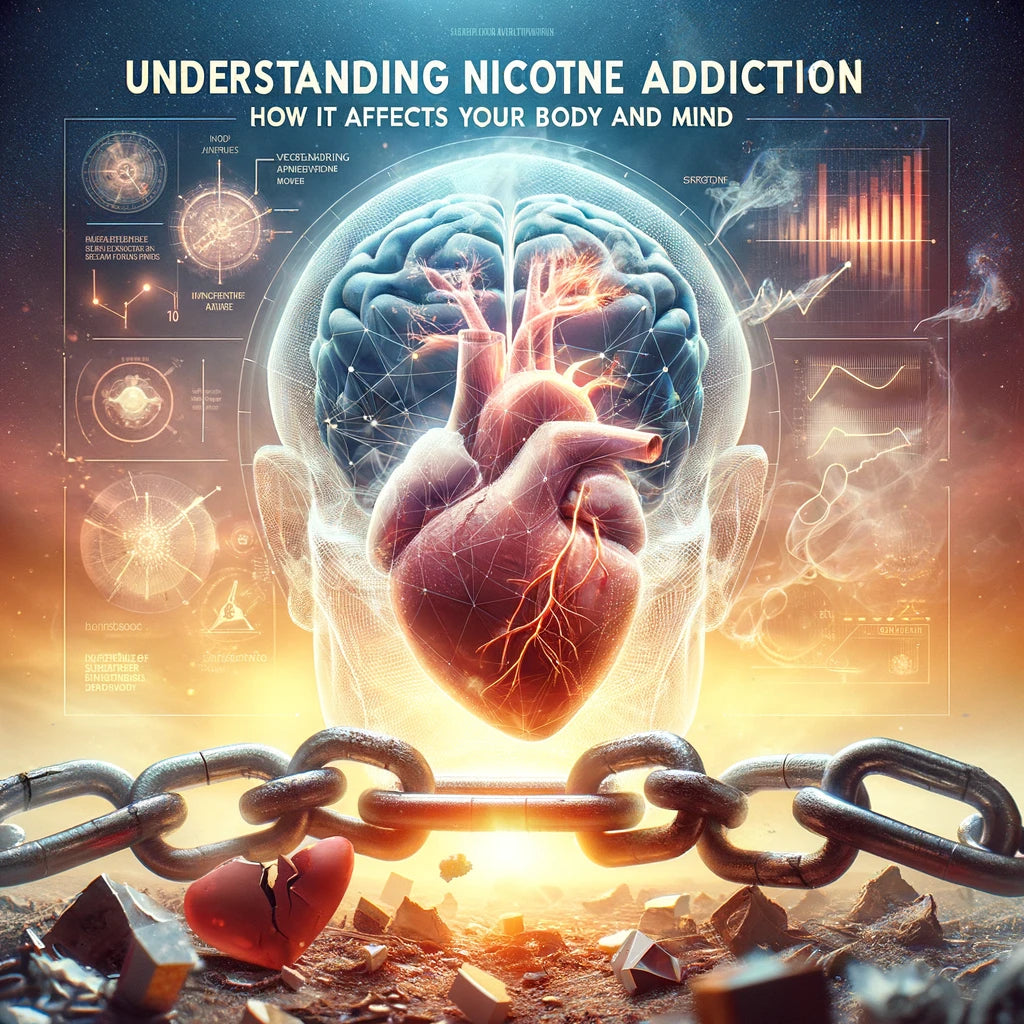
Understanding Nicotine Addiction: How It Affects Your Body and Mind
Share
1. Introduction: Why Understanding Nicotine Addiction Matters
Nicotine addiction impacts millions worldwide, creating a powerful dependency that affects both body and mind. Understanding how nicotine addiction works is essential for anyone looking to quit vaping or smoking. By learning the science behind nicotine’s effects, you’ll be better prepared for the journey to a nicotine-free life.
2. The Science Behind Nicotine's Effect on the Brain
When you smoke or vape, nicotine enters your bloodstream and quickly reaches the brain. There, it triggers the release of dopamine, a neurotransmitter responsible for creating feelings of pleasure and relaxation. This “feel-good” reaction reinforces the habit, making you want to continue using nicotine.
Over time, your brain adapts to these dopamine surges, leading to tolerance. Eventually, you need more nicotine to achieve the same pleasurable effects, creating a cycle that can be hard to break. Understanding this process can help explain why nicotine is so addictive.
3. Physical Impacts of Long-Term Nicotine Use
Nicotine has both short-term and long-term effects on the body. Immediately after use, nicotine increases heart rate and blood pressure, causing a temporary feeling of alertness and focus. However, long-term nicotine use carries serious health risks, including:
- Heart Health Risks: Chronic nicotine use can lead to cardiovascular diseases, including heart disease, heart attacks, and stroke.
- Respiratory Issues: Prolonged nicotine exposure may lead to chronic bronchitis and emphysema.
- Weakened Immune System: Nicotine suppresses immune response, making you more susceptible to illness.
Understanding these health risks can emphasize why quitting is a vital step for overall well-being.
4. The Psychological Effects of Nicotine Dependence
Nicotine addiction doesn’t just impact the body—it also affects the mind. When nicotine levels drop, you may feel irritable, anxious, or have difficulty concentrating. These withdrawal symptoms create a cycle of dependence, where many people reach for a vape or cigarette to ease discomfort.
Stress and anxiety can also reinforce nicotine use, as people often turn to nicotine as a coping mechanism. Knowing how nicotine affects mood and behavior is essential for developing effective quitting strategies.
5. Common Challenges When You Decide to Quit Nicotine
Quitting nicotine is challenging, mainly due to withdrawal symptoms and psychological barriers. Common symptoms include:
- Headaches
- Increased appetite
- Insomnia
- Intense cravings
While these symptoms are uncomfortable, they are temporary. With the right support—like a quit plan or Nicotine Replacement Therapy (NRT)—you can manage them and stay committed.
Psychological barriers, such as breaking habits and avoiding triggers, also play a significant role. Identifying these obstacles can help you develop a plan to overcome them and make quitting easier.
6. Health and Mental Benefits of Quitting
The benefits of quitting nicotine are substantial and can transform both physical health and mental well-being. Health improvements begin almost immediately:
- Heart Health Benefits: Within hours, heart rate and blood pressure start to normalize.
- Reduced Disease Risk: Over time, your risk of heart disease, stroke, and respiratory issues significantly decreases.
Quitting also improves mental well-being. Many former users report feeling less anxious, more in control, and happier overall. These benefits can motivate you to continue with your quitting plan and enjoy a higher quality of life.
7. Effective Tools and Strategies to Quit Nicotine
Fortunately, there are numerous strategies available to help you quit:
- Nicotine Replacement Therapy (NRT): NRT products such as patches, gum, and lozenges provide controlled doses of nicotine, helping to manage cravings and reduce withdrawal symptoms.
- Behavioral Therapy: Cognitive-behavioral therapy (CBT) addresses the psychological side of addiction. Working with a therapist can help you develop effective coping strategies and replace habits associated with nicotine use.
- NicQuit for Gradual Reduction: For those seeking a structured reduction approach, NicQuit offers a system that reduces nicotine gradually. The NicQuit kit includes e-juice bottles with progressively lower nicotine levels, allowing you to taper off slowly. Customers need their own refillable device, and SMOK products are recommended for their reliability and quality.
Reading success stories from people who have quit nicotine can also be encouraging and serve as a source of motivation.
Conclusion: Moving Beyond Nicotine Dependence
Understanding nicotine addiction is the first step toward overcoming it. By learning how nicotine affects your body and mind, you can better prepare for the challenges of quitting. The benefits of quitting are substantial and lasting, far outweighing the temporary discomforts of withdrawal.
Explore various tools and strategies—from NicQuit and NRT to behavioral therapy—and seek support from friends, family, or online communities. Every step brings you closer to a healthier, nicotine-free future.